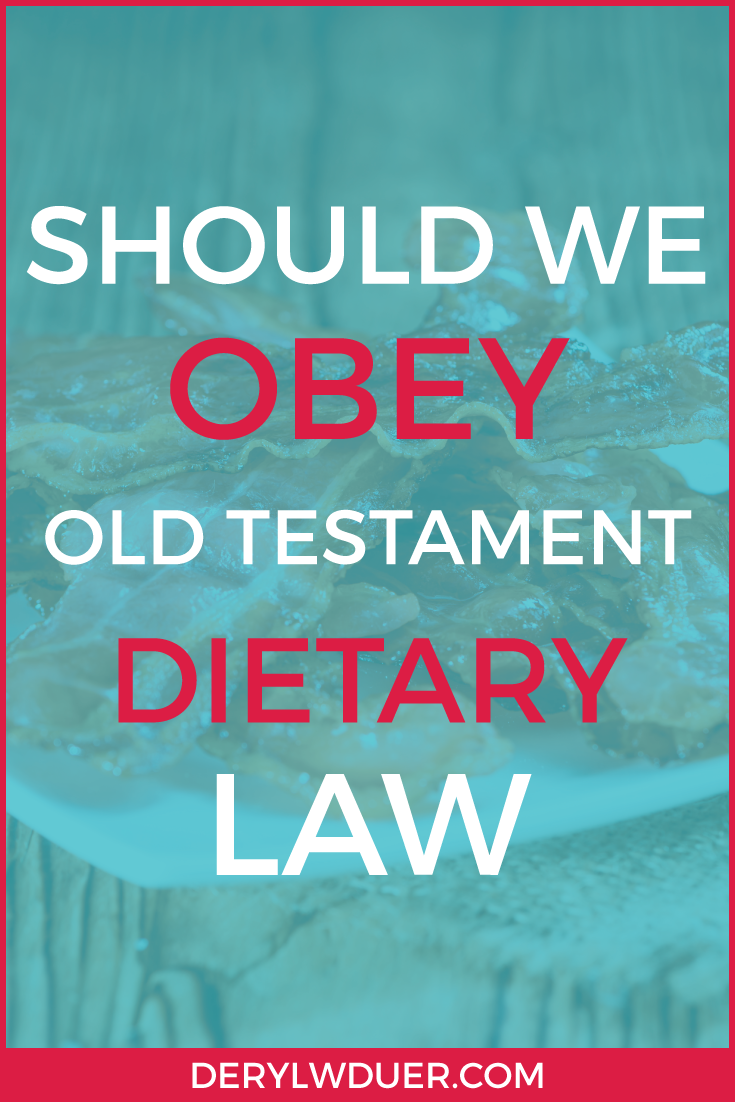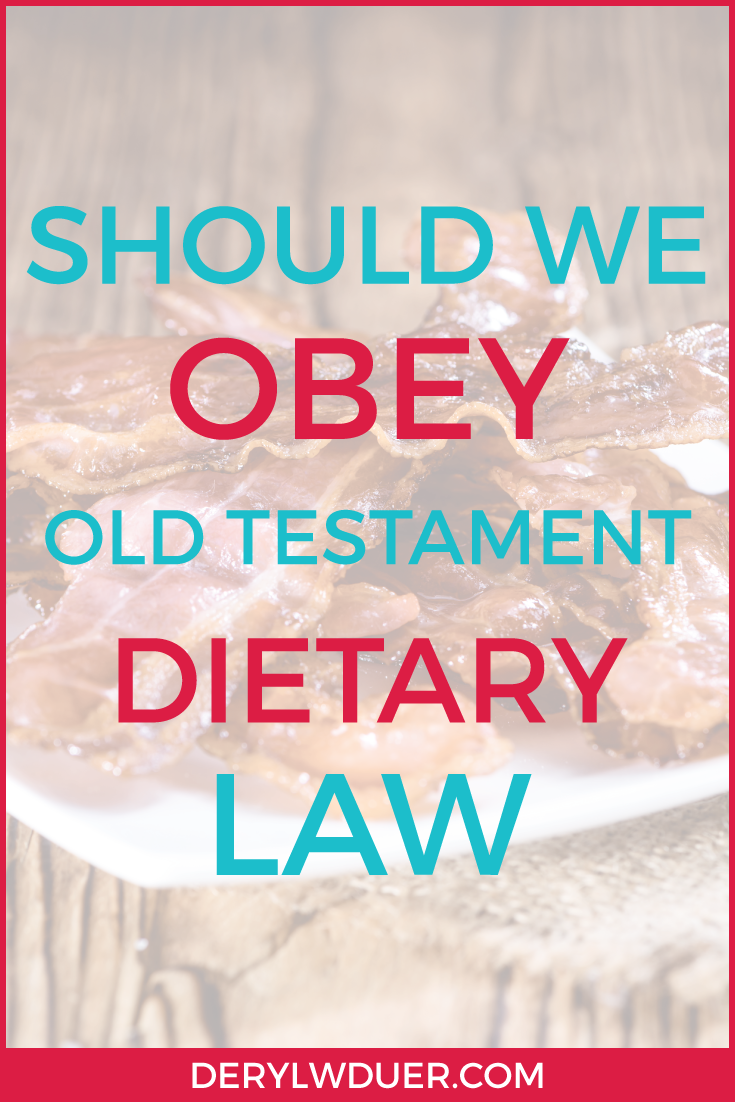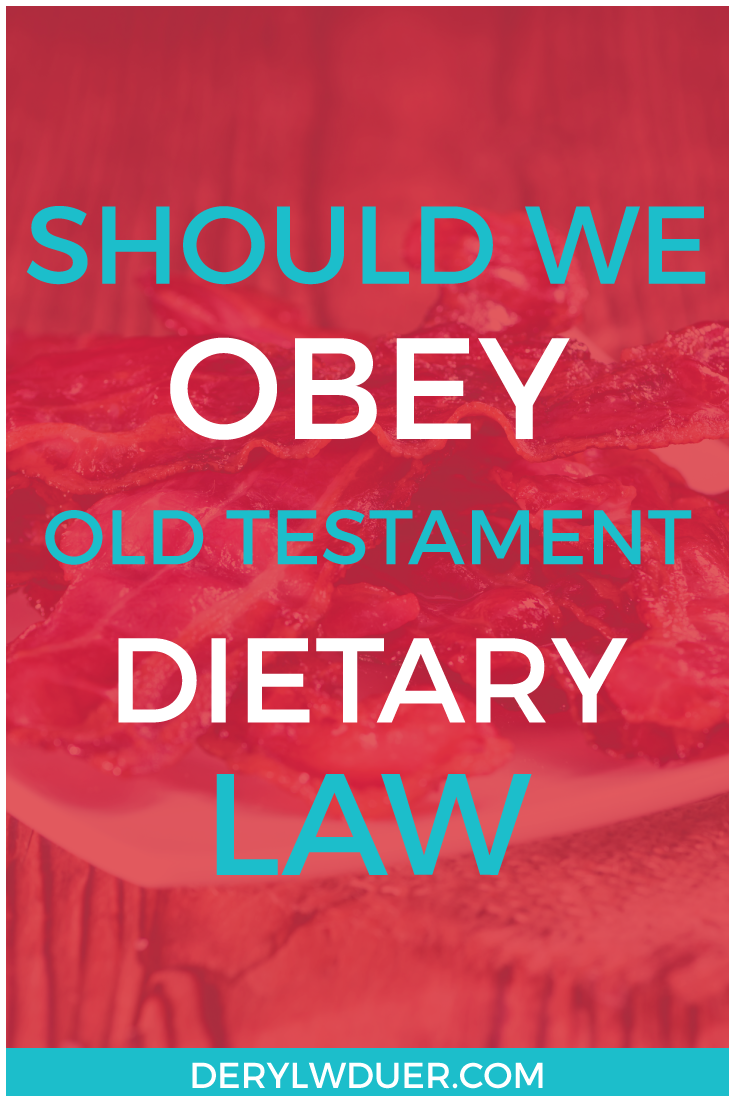Should We Obey Old Testament Dietary Law?
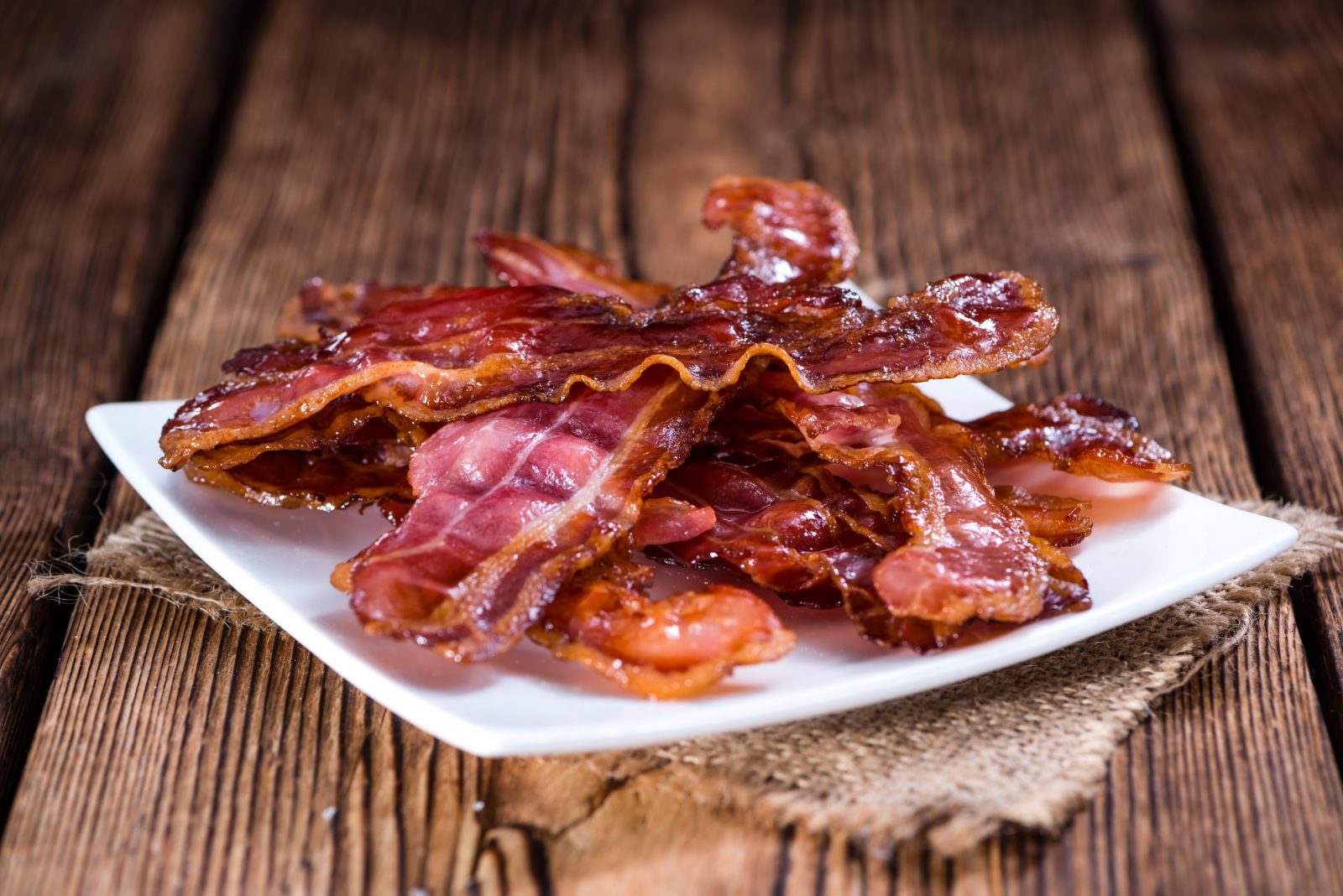
Should We Obey Old Testament Dietary Law? This is a question I wrestled with for years until I realized I was asking the wrong question. Allow me to explain.
Usually, when this question is discussed, the emphasis is something like, “Is it sinful for me to eat pork, bacon, shrimp . . . whatever.”
Meaning, is keeping the Old Testament law necessary for justification and spiritual maturity? That’s a pretty easy answer—no.
Whew! You can breathe a sigh of relief. Go ahead and grab that bite of bacon-wrapped shrimp. . .
But before you do, perhaps we should ask (and answer) the right question.
The question we just answered is, “Can we eat pork, etc.” or “Is it permissible to eat pork?” But the question is not “can we eat,” but “should we eat.”
Cosmic Killjoy or Loving Father?
I was on a coaching call last night with a client who also happens to be a very dear friend. At one point during our call, we were discussing a chapter in my book, Fully Alive: Discovering God’s Heart and Design for Our Health, where I talk about this very subject.
She said, “It’s funny, we were discussing this very topic at my church last week during Bible study.” They were going through the book of Leviticus and came across Leviticus 11 where God distinguishes between clean and unclean animals.
One lady in the group piped up, “Thank God we are no longer under the Law, but under Grace, so I can have my bacon.” I’m sure her comment drew more than one, “Amen!”
Then she added, “But God must have had a reason for these laws. Surely He meant them for our good. We’d probably be healthier if we didn’t eat the unclean animals.” Amen!
And that’s it.
Should We Obey Old Testament Dietary Law?

Should We Obey Old Testament Dietary Law?
What’s essential for us is to understand God’s purpose — His heart — in giving us these rules. What is their purpose? How are they relevant to us today? As it turns out, He gave them to us to improve our health.
Esteemed theologian, J. Vernon McGee, concluded, “Since God forbade the eating of certain animals and permitted the eating of others, it must be assumed that there was a health factor involved.”
The Expositor’s Bible Commentary said, “It is of much significance to note, in the first place, that a large part of the animals which are forbidden as food are unclean feeders. It is a well-ascertained fact that even the cleanest animal, if its food be unclean, becomes dangerous to health if its flesh be eaten.”
There is abundant evidence that the biblical laws were given for health reasons as well as spiritual, even though Moses and the Israelites wouldn’t have understood the health aspect. God is not some cosmic killjoy out to deny you pleasure. Far from it. Pleasure is His invention.
God is a loving Father who wants the best for you.
Asking the Right Question
I know some of this probably hits close to home. However, it’s important to understand that when it comes to our health—especially our food choices—we are driven by forces deep below the surface: “The purpose in a man’s heart is like deep water” (Proverbs 20:5 ESV)
The problem is that we are “looking for love in all the wrong places” to quote a famous song.
In his book, Food and Love, Christian relationship expert Gary Smalley, highlights the cycle that many of us live in where the health of our diet and the health of our relationships contribute to one another. We try to fill a void in our hearts with food.
That is why you often hear people talk about being emotional eaters. Understanding why we do what we do can help us in fixing what we do.
I remember as a high school student asking my youth minister how far was “too far” when it came to relationships with the opposite sex. His answer humbled me and showed me the error of my thinking.
He said, “You’re asking the wrong question. Instead of asking how far you can stretch God’s law without breaking it, you should be asking how can I best glorify God in my relationships.”
Ouch. That hurt—not because it was mean or legalistic, but because I knew in my heart that he was right.
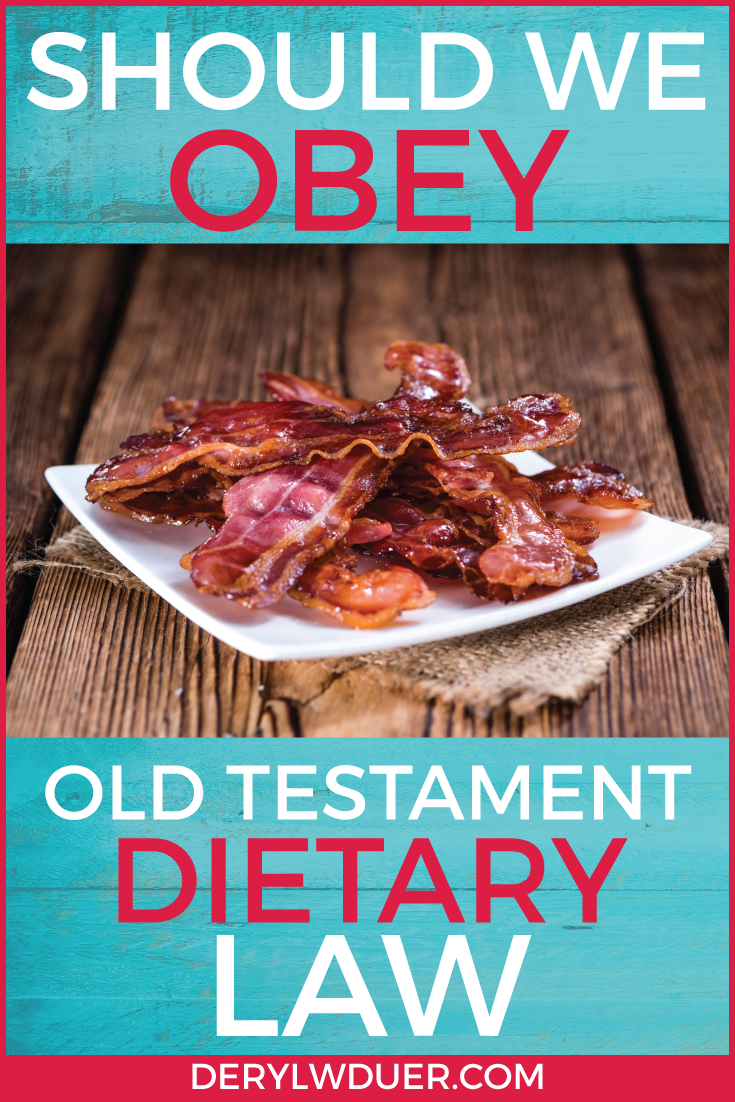
The same is true when it comes to food. Remember the verse, “So, whether you eat or drink, or whatever you do, do all to the glory of God” (1 Corinthians 10:31 ESV)? The question really isn’t, “Can I eat this?” Instead, it’s “Should I eat this?
Again, Paul reminds us, “You say, ‘I am allowed to do anything’—but not everything is good for you. Moreover, even though ‘I am allowed to do anything,’ I must not become a slave to anything” (1 Corinthians 6:12 NLT). The immediate context of this verse is sexual, but it is a general principle for all of our physical drives.
The question here is one of authority and power: Who’s in control, you or your appetites? Are you a slave to your desires or God?
Is this something that is good for you, or something that will harm you? Like any good parent, God only establishes rules for our benefit. He gives us guidelines because He loves us and wants the best for us.
Certainly, we can agree that no New Testament verse forbids following the dietary laws—especially for health reasons. And there is compelling evidence that those health reasons are as valid today as they were 3,500 years ago.
Proper Perspective
If you think about God’s food laws as restrictions that require an unbearable sacrifice, you’re going to struggle. But what if you turn it around?
Focus on all the amazing and delicious foods God did give you—how much better you will feel when you stick to them.

The bottom line is that in order to live well, we must change our habits. We must redefine our approach to food. We can’t just do whatever we feel like doing because our bodies belong to God, not to us.
God is the author of the biblical health laws. The Bible reveals that God does not change (Malachi 3:6), which means that His fundamental laws do not change.
The laws of biology did not suddenly change, or stop operating when Jesus came on the scene. The same factors that caused or prevented disease in the days of Moses still operate today.
To be our best, we must suppress the desire for what feels good in the moment and pursue what best allows us to serve our Creator.
We live for a higher purpose and calling. Fortunately, God has given us an instruction book, The Bible, that tells us where the boundaries are.
If we ignore His guidelines, we will pay the price in our bodies and in our lives, but if we live our lives according to His guidelines, He will satisfy our desires and give us abundant life.
We will be fit and healthy, live longer, enjoy a higher quality of life, increased energy and improved mood. We will be fully alive!
Should We Obey Old Testament Dietary Law?
Should We Obey Old Testament Dietary Law?
What’s the Answer?
So, what’s the answer? Should we obey the Old Testament dietary laws?
If you choose to not to eat pork, or other unclean animals, for health reasons, good on you! You are free to eat or not eat.
However, the moment you make not eating unclean animals a requirement for justification or spiritual maturity, you’ve crossed a line into dangerous territory.
As the Apostle Paul said, “Therefore no one is to act as your judge in regard to food or drink or in respect to a festival or a new moon or a Sabbath day — things which are a mere shadow of what is to come; but the substance belongs to Christ.” (Colossians 2:16–17 NAS95)
Should we obey the Old Testament dietary laws? I believe so. You’re probably going to be healthier if you do.
Must we obey the Old Testament dietary laws? No.
Digging Deeper
This blog post barely even scratches the surface of the question of whether or not we should obey the Old Testament dietary law. You probably noticed I didn’t even get into a discussion of Jesus declaring “all foods clean” (Mark 7:18-19), or Peter’s vision (Acts 10-11).
There isn’t room in a single blog post to fully dive into the topic. If you would like to learn more, I have almost an entire chapter of my book, Fully Alive: Discovering God’s Heart and Design for Our Health, devoted to this very question. I dig deep into the Scriptures, science, and evidence for the dietary laws.
Order your copy today on Amazon.
Should We Obey Old Testament Dietary Law?
